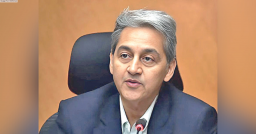Latest News
PROPAGATION, PRACTICE, AND PUBLIC EXPRESSION ...of religion are not absolute rights
.png)
Personal laws are not considered equivalent to religion, and the Constitution envisages the possibility of a Uniform Civil Code in the future. While India differs from other South Asian countries in terms of not declaring a state religion, it is essential to continue the discourse and navigate the delicate balance between religious freedom and regulation to maintain harmony in a diverse society.
The right of a religious denomination to manage its own affairs is limited to religious matters that are subject to public order, morality, and health. Religion encompasses a system of beliefs and doctrines that individuals and communities consider conducive to their spiritual well-being. However, religion is more than just a set of beliefs. It may include ethical rules, rituals, observances, ceremonies, and worship practices, even extending to matters of food and dress. Nevertheless, the freedom to propagate one’s religion cannot infringe upon the freedom of another person to practice their own religion.
The Indian Constitution provides protection to different denominations and religious groups by including religious rights as fundamental rights. Article 25 of the Constitution states that all individuals are equally entitled to freedom of conscience and the right to freely profess, practice, and propagate religion, subject to public order, morality, and health. Article 26 grants every religious denomination the fundamental right to manage its own affairs in matters of religion, which cannot be abrogated. Article 29 grants minorities the absolute and unqualified right to conserve their distinct language, script, and culture. Article 30 gives fundamental rights to all minorities, based on religion or language, to establish and administer educational institutions of their choice. However, the right of religious denominations to manage their own affairs is restricted to religious matters subject to public order, morality, and health. The only absolute and unfettered rights are the right to freedom of conscience under Article 25 and the right of minorities to conserve their distinct identity under Article 29.
The state is empowered by Article 25 to regulate and restrict economic, financial, political, or other social activities associated with religious practice. Consequently, freedom of religion does not include social and economic practices, as well as certain matters related to civil laws that are secular and not intrinsic to religion. In such cases, the legislature has the authority to enact uniform laws to govern these secular activities, as envisaged by Article 44 of the Constitution.
The term “religion” is not explicitly defined in the Constitution. The SC has broadly defined religion in various cases, including H.R.E v. L.T. Swamiar and S.P. Mittal v. Union of India. According to the Court, religion is a matter of faith for individuals and communities, and it is not necessarily theistic. Religion is based on a system of beliefs or doctrines that are considered beneficial to spiritual wellbeing. However, religion is more than a mere set of beliefs; it may include ethical codes, rituals, ceremonies, modes of worship, and even extend to matters of food and dress. The issue of the right to propagate religion has always been controversial, particularly in India. The question arises whether the freedom to propagate one’s religion infringes upon the freedom of others to practice their own religion. To date, there has been no central legislation specifically restricting or regulating religious conversions or monitoring religious activities aimed at propagation by denominations and religious communities. However, several states have enacted local laws imposing restrictions on religious activities, often targeting Christian missionary activities without explicit mention. These laws aim to curb conversions through force, fraud, or inducement.
Historically, during British rule, laws were enacted to protect interests of converts to Christianity. The Caste Disabilities Removal Act of 1850 abolished any law or usage that inflicted forfeiture of rights or property or impaired inheritance rights due to renouncing or being excluded from a religion or caste. After independence, several states introduced local laws to impose restrictions on religious activities. Other states followed suit, enacting similar laws to regulate conversions and protect indigenous faiths.
Although personal laws may derive from religious practices, the Indian Constitution doesn’t equate personal laws with religion. Article 44 of the Constitution calls for the endeavor to establish a Uniform Civil Code throughout India to promote national unity. However, Article 44 is a nonenforceable principle & requires parliamentary action to be implemented.
THE VIEWS EXPRESSED BY THE AUTHOR ARE PERSONAL
Abhishek Singh The writer is a Research Scholar







.png)













